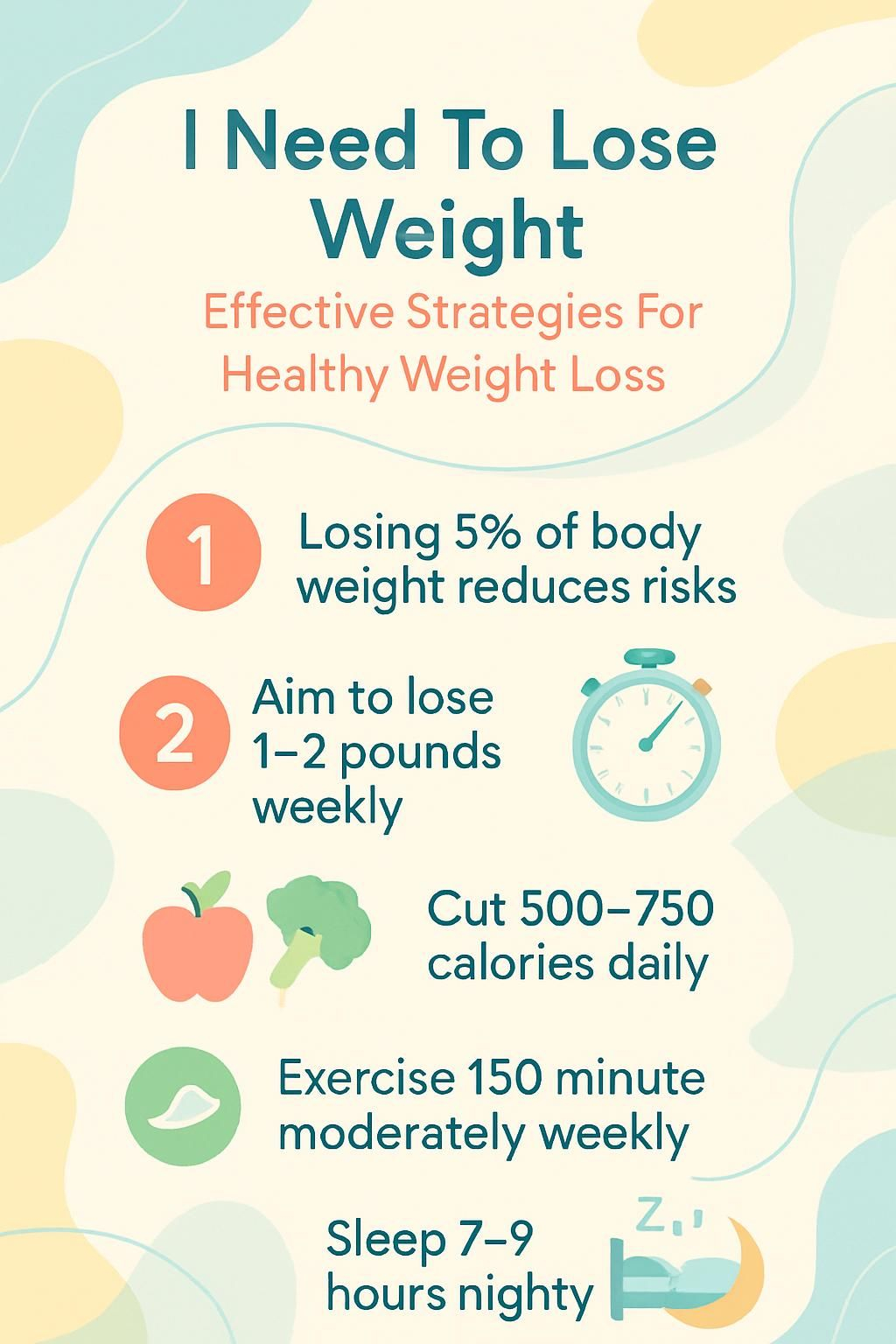I Need To Lose Weight: Effective Strategies For Healthy Weight Loss
Our Nutrition Assistant AI Suite will transform your body. You will lose fat, get toned, and build muscle. Gain confidence and optimal health.
If you have ever thought, “I need to lose weight,” you are in good company. Even modest weight loss can lower health risks and improve daily energy.
This guide shows simple steps to set goals, choose healthy foods, add physical activity, and build habits that last. Use these strategies to move toward a healthier life with less guesswork.
Key Takeaways
- Losing about 5% of your body weight, for example 10 pounds from 200, can lower your risk for heart disease and type 2 diabetes, according to the CDC.
- A safe pace is 1 to 2 pounds per week. Aim for a daily calorie deficit of 500 to 750, paired with at least 150 minutes of moderate exercise each week.
- Base meals on vegetables, fruits, lean protein, and whole grains. Limit sugary drinks and highly processed foods to avoid excess calories.
- Tracking tools increase accountability, and meeting with a healthcare professional or registered dietitian supports safe, long-term success.
- Sleep 7 to 9 hours and manage stress with mindfulness or yoga. These habits help regulate appetite hormones and support steady progress.

Why Is Losing Weight Important for Your Health?

Losing weight can improve your health and reduce the chance of serious conditions. Many people notice more energy, better sleep, and less strain on joints.
What are the health benefits of losing weight?
Even a small change helps. Dropping 5 percent of your body weight can reduce the risk of high blood pressure, heart disease, stroke, and type 2 diabetes. You may also see better cholesterol numbers and steadier blood sugar.
A steady pace, about 1 to 2 pounds per week, is easier on your body and your mind. Everyday tasks feel lighter as extra fat decreases and fitness improves.
Less weight means less pressure on hips and knees, so movement gets more comfortable. Organizations like the American Heart Association encourage a healthy weight to protect your heart and lungs.
What risks are associated with excess weight and obesity?
More than 40 percent of U.S. adults live with obesity. Extra weight raises the risk for type 2 diabetes, high blood pressure, heart disease, and some cancers.
Obesity can strain joints and lead to sleep problems such as sleep apnea. Genetics, age, hormones, certain medicines, and your environment all play a part.
Daily life can feel harder too. Low energy, discomfort during activity, and mental strain are common. Talking with a healthcare provider can uncover medical issues or medication effects that make weight loss tougher.
Maintaining a healthy body weight supports health outcomes first, not appearance.
Next, see how smart goal setting protects your health and supports steady progress.
How Can I Set Realistic Weight Loss Goals?
Clear, realistic targets keep you focused and motivated. They also make success more likely.
Why should I consult a healthcare professional before losing weight?
A healthcare professional can help you set a safe goal weight using your history, current health, and medications. They can check for conditions such as thyroid disease or diabetes that may slow progress.
For most people, 1 to 2 pounds per week works well with a balanced eating plan and regular activity. Your provider may also refer you to a registered dietitian who can build a meal plan based on Mediterranean or DASH styles.
Regular check-ins help track results and catch side effects early. This support steers you away from risky fad diets or very low calorie plans that are hard to sustain.
How can I aim for gradual and sustainable weight loss?
Set a goal to lose 1 to 2 pounds per week. That means creating a daily calorie deficit of 500 to 750 through food choices, activity, or both.
Use action-based goals, such as “Walk 30 minutes daily,” instead of focusing only on the scale. Start with an initial target like 5% of your body weight. If you weigh 180 pounds, aim for about 9 pounds first.
Avoid drastic changes that are hard to keep. Build habits with small, steady steps and choose nutrient-rich foods instead of cutting entire food groups.
Building a Strong Foundation for Weight Loss Success
A strong foundation keeps you going when life gets busy.
How do I discover my motivation for losing weight?
motivation matters most for long-term change. List your reasons, such as better health, more energy, or keeping up with your kids. Place reminders where you will see them often.
Family health history can add urgency and clarity. One simple example, I used a photo from a favorite hike as my phone background. It kept my goals top of mind.
How can I track my current habits and lifestyle effectively?
Tracking shines a light on patterns that help or hurt progress. Use a notebook or an app, then review weekly.
- Log every meal and drink, including time and portion sizes. Apps like MyFitnessPal or Lose It! make calorie restriction easier.
- Record physical activity, such as aerobic exercise or strength training, with minutes and intensity. Aim for at least 150 minutes of moderate activity weekly.
- Track sleep hours. Getting less than 7 hours often slows weight loss.
- Note stress levels and coping tools. High stress can raise cortisol, a hormone that promotes fat storage around the waist.
- Write about eating habits, like skipped meals or late snacking, and common cravings for sugary foods or drinks.
- Consider social factors, such as family food choices or work schedules that disrupt healthy routines.
- Review trends and adjust meals or activity to trim extra calories a day.
- Share your records with your health care provider or a registered dietitian for tailored advice.
This process gives you clear feedback so you can fine-tune habits and stick with your weight management plan.
Effective Dietary Strategies for Weight Loss
Simple food choices can help you lose weight and keep it off.
How can I reduce my calorie intake safely?
Target a daily deficit of 500 to 750 calories. That usually leads to a loss of 1 to 2 pounds per week, based on clinical nutrition guidance from sources like the Mayo Clinic.
Choose foods that are low in calories and high in fiber, such as vegetables, fruits, and whole grains. Cut added sugars by skipping desserts and sodas. Small swaps add up.
Pick healthy fats like olive oil, but use modest amounts. Choose low-fat or fat-free dairy to stay full with fewer calories. Practice mindful eating, chew slowly, and stop when you feel satisfied.
What are whole, nutrient-rich foods I should focus on?
Whole, nutrient-rich foods keep you full and energized while supporting better health.
- Eat at least 4 servings of vegetables daily. They are low in calories and high in fiber and micronutrients.
- Choose fruits like berries or apples for at least 3 servings a day. Fruit provides fiber and antioxidants.
- Pick whole grains, such as brown rice, quinoa, or whole-wheat bread, for steady energy.
- Include lean proteins at each meal. Chicken breast, fish, beans, tofu, and eggs support muscle repair.
- Use healthy fats from avocados, nuts, seeds, or olive oil in moderate amounts.
- Avoid sugary drinks, including soda and energy drinks, since they add calories without fullness.
- Limit processed foods that can hide added sugars, salt, and unhealthy fats.
- Build meals around patterns like Mediterranean or DASH for balance and variety.
- Mix colorful produce across the week. A rainbow of choices supplies a range of helpful plant nutrients.
These steps align with major health system guidance and support long-term weight management.
Why should I limit sugary drinks and processed foods?
Sugary drinks pack calories with little nutrition. The CDC reports that nearly half of added sugar in the U.S. diet comes from sweetened beverages. One 12-ounce soda can top 35 grams of sugar, about nine teaspoons.
Processed snacks and pastries often combine sugar and unhealthy fats. That mix makes it easy to overeat and exceed your calorie goal. I made progress after swapping soda for water and skipping packaged desserts during meals.
Reducing sugary beverages and heavily processed foods helps lower calorie intake and supports a healthy weight. Source: Centers for Disease Control and Prevention.
What balanced diets like Mediterranean or DASH are effective?
The Mediterranean diet centers on whole grains, fruits, vegetables, nuts, olive oil, fish, and lean poultry. The DASH diet is similar but places tighter limits on sodium and includes more low-fat dairy.
Both styles are satisfying and nutrient dense, which supports steady weight loss. Tools like MyPlate can help you build meals that fit these patterns. For special situations, ask a healthcare provider or registered dietitian about very low calorie plans or meal replacements.
How Do I Incorporate Regular Exercise into My Routine?
Think of exercise as daily movement that keeps your engine running smoothly.
How much exercise should I aim for weekly?
Aim for at least 150 minutes of moderate aerobic activity each week. Split it into 30-minute sessions on five days to make it easier to schedule.
Add strength training at least twice a week to maintain muscle and raise metabolism. Pick activities you enjoy, such as walking, swimming, or cycling, to boost consistency.
What is the best way to combine aerobic and strength training?
Mix both types across your week. Aerobic exercise raises your heart rate, and strength training builds lean muscle. This combination supports weight loss and overall fitness.
Schedule cardio on some days, then do resistance work on others to allow recovery. The American Heart Association supports this balanced approach for heart health and weight control.
How can I find enjoyable physical activities to stay consistent?
Choose activities you actually like so you will repeat them. Wear comfortable shoes and clothing to make movement feel easier.
Collect small wins. Take stairs, park farther away, or march in place during TV. I started parking at the far edge of the lot and gained 2,000 extra steps per day.
Vary options, such as a solo walk some days and a group class on others. Fun keeps you coming back.
What Healthy Lifestyle Changes Support Weight Loss?
Daily habits shape your results as much as any diet plan.
How much sleep do I need for effective weight loss?
Get 7 to 9 hours of sleep nightly. Poor sleep can raise hunger and lower willpower, which makes weight control harder.
Two hormones, ghrelin and leptin, help manage appetite. Too little sleep can disrupt both. Prioritizing rest makes it easier to exercise, cook, and follow your plan.
What are effective ways to manage stress like mindfulness or yoga?
Stress control reduces emotional eating and supports healthier choices. Try one or two methods and build from there.
- Practice mindfulness for five minutes a day, focusing on your breath.
- Use a guided meditation app like Headspace or Calm.
- Do yoga two times a week to lower cortisol and improve mood.
- Use deep breathing before meals to slow down and notice hunger cues.
- Talk with a healthcare professional for a personalized stress plan.
- Join a group class to add social support and structure.
- Set daily relaxation time to read, walk, listen to music, or journal.
- Track stress triggers to spot links between mood and food choices.
Why should I avoid skipping meals or fad diets?
Skipping meals often backfires. Hunger builds, and you may overeat later or choose high calorie snacks.
Fad diets promise fast results but rarely last. Many lack key nutrients and can cause fatigue. Choose regular, balanced meals with whole foods and lean proteins. Steady habits protect your health and your progress.
Tools and Resources to Support Your Weight Loss Journey
Helpful tools add structure and accountability to your plan.
What are the best calorie and activity tracking apps?
MyFitnessPal makes logging meals simple, with a large food database and barcode scanning. Fitbit tracks steps, activity minutes, sleep, and water intake in one place.
You can also use Mayo Clinic’s online assessment tools for calories and BMI. Whether you use an app or a notebook, tracking boosts awareness. Seeing the numbers helped me stay steady during tougher weeks.
How can registered dietitians help me lose weight?
Registered dietitians create meal plans that fit your health, culture, and budget. They teach safe calorie reduction and ensure you meet nutrient needs.
Programs like UC Davis Health’s “Achieving a Healthy Weight” are led by dietitians. They adjust plans, review progress, and answer questions about nutrition or bariatric surgery if your doctor recommends it.
What weight management programs or support groups can I join?
Structured programs and peer support improve consistency and motivation.
- UC Davis Health’s “Living Light Living Well” offers a comprehensive, fee-based program with professional coaching.
- Community centers often run free classes with nutrition workshops and group exercise.
- Hospitals and clinics may offer programs led by dietitians, nurses, or other staff.
- Commercial options like Weight Watchers (WW) provide meetings, digital tools, and online communities.
- Support groups such as Overeaters Anonymous host in-person or virtual meetings using a 12-step model.
- Local food pantries and farmers markets may share nutrition education and activity sessions.
- Online forums like MyFitnessPal connect users who log workouts and share tips and success stories.
How Can I Overcome Common Weight Loss Challenges?
Every plan hits bumps. Simple adjustments help you keep moving forward.
How do I deal with weight loss plateaus?
Plateaus are normal. Review your logged meals and exercise to spot hidden calories or missed workouts.
Trim snack portions, add 10 minutes to workouts, or increase protein. I stalled for three weeks before I found extra evening calories in my snacks.
If progress stays flat, change your routine, try new activities, or meet with a healthcare professional. Consistency wins over time.
What strategies help me stay motivated long-term?
Write your reasons for losing weight and post them where you will see them daily. Keep your goals visible.
Celebrate small wins, like a step goal or a healthy lunch choice. Ask friends or coworkers for support when you feel stuck. I shared weekly updates with a close friend and it kept me steady.
How can I combat emotional eating effectively?
Use mindful eating to notice feelings before and during meals. If stress sparks cravings, walk, breathe deeply, or call a friend.
Track your mood and intake to spot patterns. I struggled with late-night snacking after stressful days, but journaling helped me choose different responses over time.
Plan soothing activities, such as reading or a short stretch session, when emotional hunger rises.
How Do I Monitor and Adjust My Weight Loss Plan?
Frequent check-ins guide smart changes and prevent frustration.
How often should I track progress and adjust goals?
Track weight weekly and log measurements, activity, and sleep. Schedule monthly check-ins with a healthcare professional for tailored advice.
Adjust goals if progress stalls for three weeks or after steady success. Small tweaks, such as adding a 10-minute walk, often produce results. Celebrate non-scale wins like deeper sleep or more energy.
Summary: Track weekly, review monthly, and adjust quickly based on your data.
Why is it important to celebrate small successes along the way?
Small milestones build momentum. Noticing a two-pound loss or skipping a sugary drink reinforces good habits.
People who mark tiny wins stay with programs longer. Try a simple reward, such as saving five dollars each week you hit your step goal, then buy new workout gear at month’s end.
Each small win proves your actions matter, which helps you stay the course.
Tips for Long-Term Weight Management
Long-term weight management relies on steady habits and support.
How can I maintain healthy habits after losing weight?
Keep routines that helped you succeed. Stock vegetables, fruits, lean proteins, and whole grains at home. Choose water or unsweetened drinks.
Use smaller plates to help control portions. Plan movement and track progress with an app. Aim for 7 to 9 hours of sleep nightly.
Weekly grocery lists kept me on track after I lost 20 pounds. Planning ahead helped me avoid ultra-processed snacks during busy days.
Check in with a support group or registered dietitian to solve small problems early. This reduces the risk of weight cycling, which is linked to higher disease risk.
What can I do to avoid weight cycling and stay consistent?
Choose a healthy lifestyle, not quick fixes. Focus on balanced meals and regular activity most days of the week.
Prepare healthy snacks and schedule workouts. Track your progress and celebrate small steps, like extra vegetables or more daily steps. A tracking app helped me stay aware without feeling overwhelmed.
These habits help you maintain your goal weight and avoid losing and regaining the same pounds.
Additional Tips for Weight Loss Success
Small daily actions can make a big difference over time.
How much water should I drink each day?
Drink water throughout the day. Replacing sugary drinks with water lowers calories and supports weight control.
A common target is eight 8-ounce glasses daily, but needs vary with age, activity, and climate. Staying hydrated can reduce snack cravings because thirst is sometimes mistaken for hunger.
How can controlling portions with smaller plates help?
Plate size guides portions. Using plates under 9 inches often reduces how much you serve yourself without feeling deprived.
You can pre-portion snacks or split large meals. Switching from a 12-inch plate to an 8-inch plate can reduce calorie intake significantly. Meals also look fuller on smaller plates.
Why should I chew food slowly and mindfully?
Eating slowly helps your brain register fullness, which can cut calorie intake. Many people feel satisfied with less food when they pause between bites.
Turn off screens, chew well, and notice taste and texture. This supports portion control and makes meals more enjoyable.
When Should I Seek Professional Help for Weight Loss?
Sometimes medical care can support your effort and protect your health.
When is bariatric surgery or medical intervention necessary?
Doctors may consider bariatric surgery if your BMI is 40 or higher, or 35 with weight-related conditions like type 2 diabetes, high blood pressure, or sleep apnea.
Prescription weight loss medicines may help if diet and exercise have not worked and your health remains at risk. These options require medical oversight to manage benefits and side effects.
How do underlying health conditions affect weight loss?
Conditions like hypothyroidism, polycystic ovary syndrome, and insulin resistance can slow fat loss. Some medications for mood, blood sugar, or blood pressure can also cause weight gain.
Ask your healthcare provider to check for medical factors. My progress improved after treatment for PCOS and a medication review.
Dietitians can match nutrition plans and activity to your needs so you can lose weight safely.
Conclusion
Healthy weight loss takes patience and steady effort. Focus on whole, nutrient-rich foods and pair them with regular physical activity, including both aerobic exercise and strength training.
Track your progress, set realistic goals, and ask for support from friends, family, or professionals when you need it. Even losing 5% of your weight can lower the risk of heart disease and type 2 diabetes.
Use simple tools, such as food journals or apps, to guide daily choices. Small changes, repeated often, turn into lasting habits. This content is educational and does not replace medical advice. Talk with a healthcare professional before major changes to your eating plan, exercise routine, or medications.
FAQs
1. What are the most effective strategies for healthy weight loss?
Effective strategies include eating fewer calories, increasing physical activity, and choosing nutrient-rich foods. Studies show that combining a balanced diet with regular exercise leads to better long-term results than dieting alone.
2. How much weight can I safely lose each week?
Research from the Centers for Disease Control and Prevention suggests losing 1 to 2 pounds per week is safe and sustainable. Rapid weight loss often leads to regaining lost pounds over time.
3. Can tracking food intake help with weight management?
Tracking what you eat helps many people become aware of their habits and make healthier choices. A study published in Obesity found that those who kept daily food records lost twice as much weight as those who did not track their meals.
4. Are there risks linked to quick-fix diets or supplements?
Quick-fix diets and unregulated supplements may cause health problems such as nutrient deficiencies or heart issues according to data from the National Institutes of Health. Choosing evidence-based methods like gradual calorie reduction supports lasting success.
Summary: Healthy weight loss relies on steady progress, mindful eating, consistent activity, and proven approaches rather than shortcuts or extreme measures. Personal experience shows small changes add up over time; keeping a journal helped me notice patterns in my own eating habits which led to better decisions day by day.







